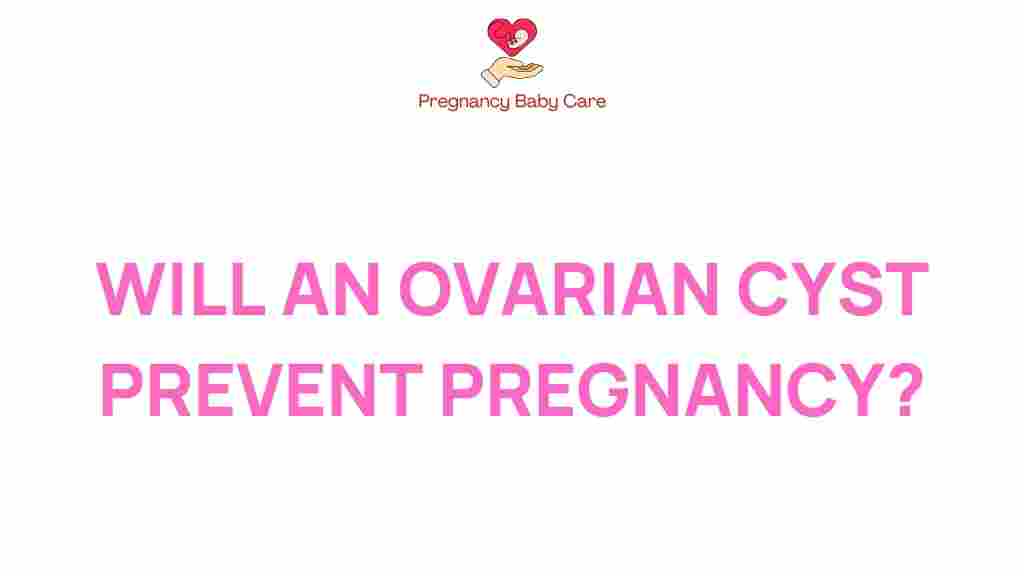The Surprising Truth: Can an Ovarian Cyst Affect Your Pregnancy Chances?
When it comes to women’s health, understanding the various factors that influence reproductive health is critical, especially for those trying to conceive. One such factor that often raises questions is the presence of an ovarian cyst. Many women may wonder, “Can an ovarian cyst affect my pregnancy chances?” In this article, we will explore the relationship between ovarian cysts and pregnancy, delving into how they impact fertility, ovulation, and overall reproductive health.
Understanding Ovarian Cysts
An ovarian cyst is a fluid-filled sac that forms on or inside an ovary. They are quite common and can occur at various points during a woman’s menstrual cycle. Most ovarian cysts are benign and resolve on their own without causing any significant health concerns. However, it’s essential to understand the different types of ovarian cysts and their potential impacts on fertility.
Types of Ovarian Cysts
- Functional Cysts: These are the most common type and include follicular cysts and corpus luteum cysts, which typically form during the ovulation process.
- Dermoid Cysts: These cysts can contain various types of tissue, such as hair and skin cells, and may require surgical removal if they grow large.
- Cystadenomas: These are non-cancerous tumors that can develop from the surface of the ovary and may need to be removed if they cause symptoms.
- Endometriomas: These cysts are associated with endometriosis and can affect fertility by causing inflammation and scarring.
How Ovarian Cysts Impact Fertility
The impact of ovarian cysts on fertility and pregnancy chances varies depending on several factors, including the type and size of the cyst. Here are some important points to consider:
- Functional Cysts: Generally, functional cysts do not affect ovulation or fertility. Most women with functional cysts can conceive without any issues.
- Endometriomas: These cysts can lead to complications related to endometriosis, which can significantly impact fertility. Women with endometriosis often experience challenges with conception.
- Cyst Size and Symptoms: Large cysts may cause pain and discomfort, which can affect a woman’s overall health and ability to conceive. Additionally, if a cyst ruptures, it may lead to acute pain and require medical intervention.
Detecting Ovarian Cysts
Regular gynecological check-ups are crucial for monitoring women’s health. Ovarian cysts are often detected during routine pelvic exams or through imaging tests such as ultrasounds. If you have concerns about your reproductive health, it’s essential to communicate with your healthcare provider. They may recommend:
- Pelvic Ultrasound: This imaging test can help visualize ovarian cysts and assess their size and composition.
- Blood Tests: Hormonal imbalances can sometimes be linked to the presence of cysts, and blood tests can help identify such issues.
- Follow-up Appointments: Depending on the findings, your doctor may suggest monitoring the cyst or further evaluation.
Ovarian Cysts and Ovulation
Understanding how ovarian cysts relate to ovulation is vital for women trying to conceive. The presence of ovarian cysts can influence the ovulation process in the following ways:
- Inhibition of Ovulation: In some cases, a large cyst can prevent the ovary from releasing an egg, leading to an anovulatory cycle.
- Hormonal Changes: Hormonal imbalances associated with certain types of cysts can disrupt regular ovulation patterns, making it harder to conceive.
- Normal Ovulation with Functional Cysts: Most women with functional cysts still experience normal ovulation, allowing them to conceive.
Health Concerns Related to Ovarian Cysts
While many ovarian cysts are harmless, there are some health concerns to be aware of:
- Rupture: A ruptured cyst can cause severe pain, internal bleeding, and may require emergency medical treatment.
- Ovarian Torsion: Large cysts can put pressure on the ovarian tissue, increasing the risk of torsion, which can cut off blood supply to the ovary.
- Potential for Cancer: Although rare, some cysts can be cancerous, particularly in postmenopausal women. Regular monitoring is crucial.
When to Seek Help
If you experience any of the following symptoms, it is important to consult your healthcare provider:
- Severe or persistent abdominal or pelvic pain
- Irregular menstrual cycles
- Unusual bleeding
- Difficulty conceiving after trying for a year or more
Tips for Managing Ovarian Cysts
Here are some tips for managing ovarian cysts and maintaining your reproductive health:
- Regular Check-ups: Schedule regular gynecological exams to monitor your reproductive health.
- Healthy Lifestyle: Maintain a balanced diet and regular exercise to support overall health.
- Stress Management: High stress can impact hormonal balance; consider yoga, meditation, or counseling as part of your routine.
Fertility Treatments and Ovarian Cysts
If you are struggling with fertility issues related to ovarian cysts, various treatment options may be available:
- Medication: Hormonal medications can help regulate your menstrual cycle and may reduce the size of cysts.
- Surgery: In cases where cysts are large, painful, or suspected to be cancerous, surgical removal may be necessary.
- Assisted Reproductive Technologies (ART): If ovulation is affected, treatments such as in vitro fertilization (IVF) may be considered.
Conclusion
In conclusion, while the presence of an ovarian cyst can raise concerns regarding pregnancy and fertility, it is essential to understand that many women with functional cysts can conceive without issues. However, specific types of cysts, particularly those associated with endometriosis, can have a more significant impact on reproductive health and conception.
If you have concerns about ovarian cysts and their effect on your health, it’s best to consult with a healthcare professional who can provide personalized guidance and treatment options. For more information on women’s health and reproductive issues, consider visiting this resource. Remember, maintaining open communication with your healthcare provider is key to managing your reproductive health and addressing any health concerns you may have.
This article is in the category Pregnancy and created by PregnancyBabyCare Team
